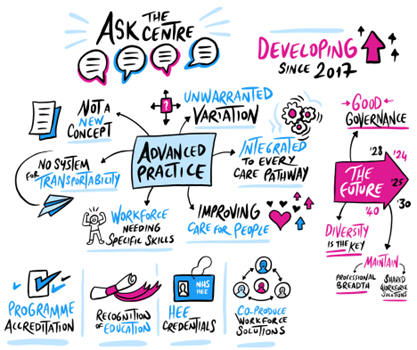You are here
Case Study: Advanced Practice
Advanced practitioners contribute to more than just patient care. Yes, there is the clinical aspect, which is essential, but advanced practitioners also work across the four pillars: clinical practice; leadership and management, education, and research. They’re senior practitioners who contribute to service delivery and leadership, making genuine differences to how services are delivered, to patient care, waiting lists, and quality of life.
Natalie RuscoeProgramme Accreditation Lead and Deputy to the Centre Lead

Summary
Advanced practitioners are redefining how multi-professional teams are working. HEE’s Centre for Advancing Practice and its regional faculties were established to oversee the implementation of advanced level practice by constituting and monitoring standards for education, training, and accrediting education programmes.
Impact
Programme accreditation
By accrediting advanced level programmes, we will consistently assure education quality. Our accredited programmes will become one of the benchmark routes to recognition for practitioners. To become Centre accredited, programmes meet capabilities and standards set out in HEE’s (2017) Multi-professional framework for advanced clinical practice in England and Standards for Education and Training set by HEE (2020). This process assures the quality of education and training against a nationally consistent benchmark with patients at the heart of it. So far, we have accredited over 101 programmes from 39 different universities.
Credentials
The term ‘credential’ is used to describe standardised, structured units of assessed learning that are designed to develop advanced level practice in discrete speciality areas. There are now several Centre-endorsed advanced practice credentials available on our Centre for Advancing Practice website, all of which support sustainable, high-quality approaches to meeting population needs by making best use of the knowledge, skills, and experience of advanced practitioners.
ePortfolio (supported) Route
The ePortfolio (supported) Route has been specifically designed to enable retrospective recognition with the Centre for Advancing Practice for existing, experienced advanced practitioners. For those whose advanced practice experiential and educational learning usually predates the 2017 publication of the Multi-professional framework for advanced clinical practice in England, the ePortfolio provides a route for recognition that recognises this quality assured equivalence of education and training ensuring a consistent and standardised national approach.
Digital badges
Digital badges indicate the advanced level of practice achieved through learning, which can be authenticated online and in real time. They recognise and celebrate learning or professional development achievements and offer assurance of education and training or educational equivalency. The Centre’s ‘Advanced’ digital badges are available to graduates of Centre accredited MSc advanced practice programmes and completers of the ePortfolio (supported) Route.
Workforce solutions
We use the term ‘workforce solutions’ as an umbrella term for activities and processes to support systems to optimally embed and utilise advanced practice within new ways of working, like the Centre’s (2022) advanced practice Governance Maturity Matrix which enables health and care organisations across all settings to self-assess their progress on implementing effective governance of advanced practice. This is a growing area of work which also includes the Centre’s guidance for workplace supervision of advancing practice and the associated minimum standards for supervision of trainees.
Future direction
Advanced practice and advanced practitioners are an essential and valued part of the workforce within our current and future NHS. We will continue to build and develop our work to support this area. Our nationwide implementation of advanced practice and credentials will continue to support areas of large-scale service transformation, for example, services like community, eye health, musculoskeletal, and older people.
Our consultant practitioner programme pilot will extend from learning disability and autism into musculoskeletal and cancer and diagnostics and key area of our work will be to drive up the evaluation of impact.
The Centre and its associated regional faculties for advancing practice, as experts within the field are continuing to gain traction. With much already achieved, we are excited for the future.